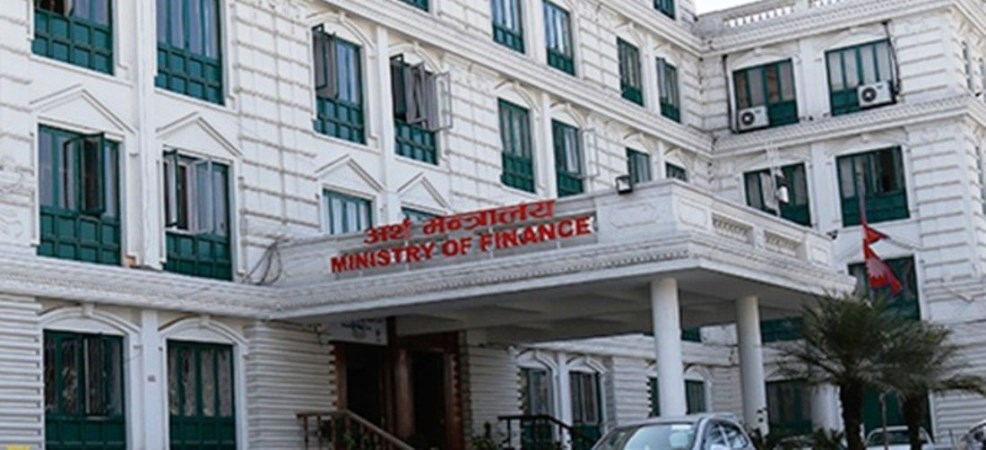COVID-19 poses formidable challenge to Finance Minister as he frames new budget

By Modnath Dhakal
Kathmandu, May 26: The current time has been turbulent for everyone with the mounting cases of coronavirus in the country. Businesses and industries are closed, people’s movements paused, workers have lost their jobs and are forced to stay home, and most development works have been stalled indefinitely.
Meanwhile, contractors say the public construction work cannot be resumed before November this year and business leaders have stressed on an economic stimulus equal to 5 per cent of the Gross Domestic Product (GDP).
The economy is severely hit by the coronavirus pandemic when the development work was gaining momentum with the completion of first half of the Fiscal Year 2019/2020 and the government has managed to collect only Rs 612.83 billion revenue of targeted Rs 1112.03 billion while only Rs 667.75 billion is spent against the target of Rs 1532.9 billion by May 24, with merely one-and-a-half months of the year remaining. The economic growth target is lowered to 2.28 per cent from the earlier projection of 8.5 per cent.
Finance Minister Dr Yuba Raj Khatiwada is presenting the budget on Thursday at the Federal Parliament amidst these uncertainties and coronavirus pandemic inflating the crisis in future. He has a challenge to allocate the scanty resources to traditional development sectors and necessities created by the pandemic that need an immediate address or overhaul.
The first challenge Dr Khatiwada has to face is the revival of the economy through the rehabilitation of business and restoration as well as creation of jobs. Months-long lockdown has severed about 2.5 million people from their jobs in and out of the country.
The country that is reeling from years of resource constraints cannot go on with relief distribution for long, so it must focus on reviving the business activities and creating jobs. When people get jobs, government's burden for relief distribution will automatically be reduced.
Private sector organisations – Federation of Nepalese Chambers of Commerce and Industry, Confederation of Nepalese Industries, Nepal Chamber of Commerce and various commodity and sectoral associations – have, for weeks, been urging the government to facilitate them in resuming the industries and businesses.
Although the Cabinet had decided to allow the industry to open, lack of policy guideline in reviving the supply chain, import of raw materials, financial arrangement and lockdown in India has discouraged the entrepreneurs. Only about a quarter of industries, primarily those dealing in food, medicine and other essential items, are in operation but just about 40 per cent of their capacity.
Despite experiencing decades of neglect, agriculture is the primary sector that can accommodate a large number of workers and businesses. The main opposition party Nepali Congress in its budget recommendations to the government has suggested promoting agriculture and tourism for job creation and providing at least 100-day employment to the people who lost their jobs. An individual can earn Rs 51,700 from that job.
Former Finance Minister Dr Ram Sharan Mahat said that local infrastructure development programmes can employ about 700,000 people. Better economic cooperation between the federal and local governments can help in effective mobilisation of resources and execution of works that can generate employment.
Likewise, bringing the cottage, small and medium scale industries into operation is critical to the economy as this sector employs the largest number of people after
agriculture. "The government should provide concessional loan to the youth, including the foreign-returnees, on the basis of skills they possess. Foreign Employment Welfare Fund should be mobilised in this programme," said the NC.
But the government should first have a database of the skilled, semi-skilled and unskilled youth, and foreign-returnee workers. Finance Committee of the Federal Parliament has suggested establishing a Rs 50 billion fund for youth employment. After discussions with multiple government agencies including the National Planning Commission, the committee said that the development of agriculture sector can address the demand for job and food security.
The Federation of Nepalese Cottage and Small Industry's recommendation to support group enterprise and promote cottage and small industries by the local governments can also be effective in creating jobs.
Establishment of cold storage, agriculture processing industries, increased use of machines in the field and efficient market linkages can propel the primary sector as an enterprising sector.
In his document of Principles and Priorities of the upcoming budget, Finance Minister Dr Khatiwada has hinted at the rehabilitation of lost jobs, and support for small and medium enterprises, agriculture and service sector to create more jobs.
He also said that the budget would give priority to the family, social and economic interest of the worker and invent labour-intensive programmes to engage the informal sector workers. He has a couple of days to stand true to his promises.
Recent News

Do not make expressions casting dout on election: EC
14 Apr, 2022
CM Bhatta says may New Year 2079 BS inspire positive thinking
14 Apr, 2022
Three new cases, 44 recoveries in 24 hours
14 Apr, 2022
689 climbers of 84 teams so far acquire permits for climbing various peaks this spring season
14 Apr, 2022
How the rising cost of living crisis is impacting Nepal
14 Apr, 2022
US military confirms an interstellar meteor collided with Earth
14 Apr, 2022
Valneva Covid vaccine approved for use in UK
14 Apr, 2022
Chair Prachanda highlights need of unity among Maoist, Communist forces
14 Apr, 2022
Ranbir Kapoor and Alia Bhatt: Bollywood toasts star couple on wedding
14 Apr, 2022
President Bhandari confers decorations (Photo Feature)
14 Apr, 2022











